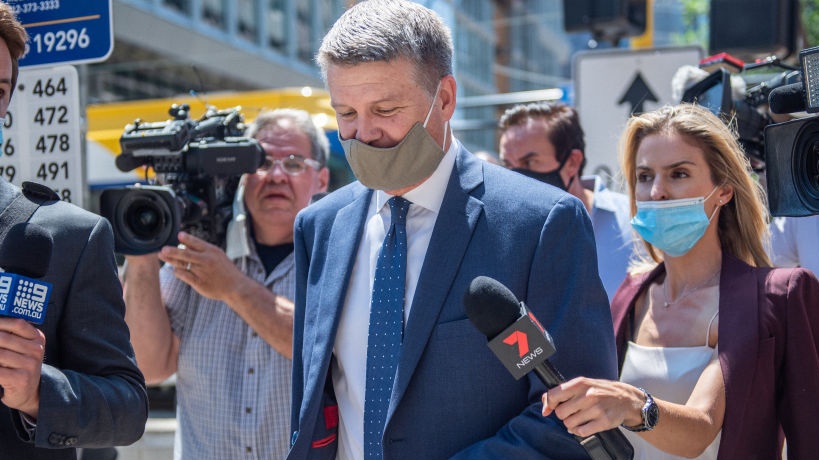Update (March 11, 2021): A Hennepin County judge ruled on Thursday to reinstate a third-degree murder charge against former Minneapolis police officer Derek Chauvin for his involvement in killing George Floyd in May 2020.
The judge's decision could potentially allow a window of opportunity to convict the former officer, whose trial began on Tuesday with jury selection at the county government center, CNN reported. Previously, Chauvin was indicted on charges of second-degree unintentional murder and second-degree manslaughter. He has since entered pleas of not guilty to all three charges.
"The charge of 3rd-degree murder, in addition to manslaughter and felony murder, reflects the gravity of the allegations against Mr. Chauvin," Minnesota Attorney General Keith Ellison said in a statement. "We look forward to presenting all three charges to the jury."
According to CNN, Judge Peter Cahill dropped the third-degree murder charge against Chauvin in October, after he decided that the charge can "be sustained only in situations in which the defendant's actions were 'eminently dangerous to other persons' and were not specifically directed at the particular person whose death occurred."
In February, an appeals court decision in the case against former Minneapolis Police officer Mohamed Noor provided a route to reinstating the charge against Chauvin, according to ABC News. As a result of the court denying Noor’s appeal for his third-degree murder conviction for the death of Damond Ruszczyk, the state jumped on the chance to appeal Cahill's ruling.
If convicted of second-degree murder, Chauvin could face up to 40 years in prison. He would see up to 25 years for the third-degree murder charge, and as much as 10 years for the second-degree manslaughter charge.
CNN reports the charges are to be considered separate, so it is possible that Chauvin could be convicted of all, some or none of the charges.
Original (March 8, 2021): The trial of Derek Chauvin, which was scheduled for Monday, has been postponed to Tuesday while questions arise about the appropriate charges that should be set forth.
On Friday, an appeals court requested that Judge Peter Cahill reconsider his original decision to dismiss a third-degree murder charge against the former officer accused of killing George Floyd in Minneapolis, Minnesota, last year, NPR reported.
But Chauvin's defense attorney, Eric Nelson, said he is planning to file an appeal to ask the court to review the question of whether Cahill should consider reinstating the murder charge.
"We're prepared to try this case. It is not our intent to cause delay," Nelson said.
Despite the uncertainty about the charges, the judge initially planned to move ahead with the jury selection process on Monday. But the pool of jurors was sent home after prosecutors said they would file an appeal of their own to stop the selection process until the questions about the charges are clarified.
"Realistically, we're not going to get to any jury selection," Cahill said on Monday, according to NPR. "We won't have an answer on the prosecution's appeal until at least tomorrow. So unless any of the parties object, I'm going to kick our jurors loose and start everything tomorrow with jury selection."
Potential jurors were supposed to be questioned by Cahill on Monday, NPR reported. Minnesota Attorney General Keith Ellison was also scheduled to lead the questioning on behalf of the state and Eric Nelson in Chauvin's defense.
Chauvin was arrested four days after he was seen in the video that showed him pinning his knee on the neck of Floyd for nearly nine minutes as the Black man laid on the pavement in handcuffs last May, as Blavity previously reported.
"Winning a conviction will be hard. I say this not because I doubt our resources or our ability, in fact, we're confident in what we're doing. But history does show that there are clear challenges here," Ellison told NPR.
According to Cornell Law School, police have been able to rely on the policy known as qualified immunity, which protects government officials against lawsuits unless the person violated a plaintiff's "clearly established" constitutional rights.
Last week, however, the U.S. House of Representatives passed the George Floyd Justice in Policing Act, as Blavity previously reported. The bill, which is now headed to the Senate, aims to ban chokeholds, eliminate qualified immunity for officers, mandate more data collection and move more funding toward community-based policing programs, among other measures.
The defendant was initially charged with second-degree manslaughter, facing up to 10 years in prison, as well as third-degree murder, capped at 25 years. Although Cahill threw out Chauvin's third-degree murder charge in October, a panel of appeals judges asked to reverse the dismissal Friday, saying Cahill hadn't followed precedent and the charges must be reconsidered.
The officer-involved killing of Floyd, which sparked a global movement against police brutality and systemic racism, is now bringing back more crowds of protesters who have been gathering outside of the governor's home in St. Paul and at the Hennepin County Government Center in anticipation of the trial. With hundreds of people gathered at the court building on Monday, the building was heavily guarded and barricaded.
The trial could last through April, with opening arguments expected to begin around March 30.
